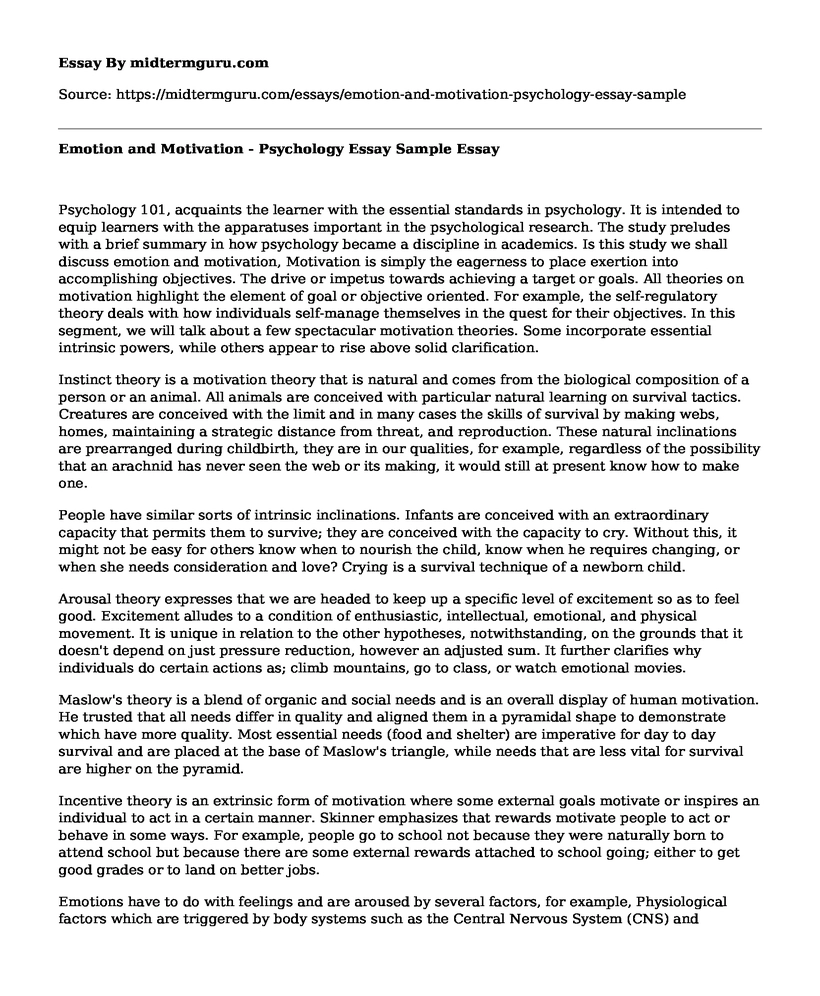Psychology 101, acquaints the learner with the essential standards in psychology. It is intended to equip learners with the apparatuses important in the psychological research. The study preludes with a brief summary in how psychology became a discipline in academics. Is this study we shall discuss emotion and motivation, Motivation is simply the eagerness to place exertion into accomplishing objectives. The drive or impetus towards achieving a target or goals. All theories on motivation highlight the element of goal or objective oriented. For example, the self-regulatory theory deals with how individuals self-manage themselves in the quest for their objectives. In this segment, we will talk about a few spectacular motivation theories. Some incorporate essential intrinsic powers, while others appear to rise above solid clarification.
Instinct theory is a motivation theory that is natural and comes from the biological composition of a person or an animal. All animals are conceived with particular natural learning on survival tactics. Creatures are conceived with the limit and in many cases the skills of survival by making webs, homes, maintaining a strategic distance from threat, and reproduction. These natural inclinations are prearranged during childbirth, they are in our qualities, for example, regardless of the possibility that an arachnid has never seen the web or its making, it would still at present know how to make one.
People have similar sorts of intrinsic inclinations. Infants are conceived with an extraordinary capacity that permits them to survive; they are conceived with the capacity to cry. Without this, it might not be easy for others know when to nourish the child, know when he requires changing, or when she needs consideration and love? Crying is a survival technique of a newborn child.
Arousal theory expresses that we are headed to keep up a specific level of excitement so as to feel good. Excitement alludes to a condition of enthusiastic, intellectual, emotional, and physical movement. It is unique in relation to the other hypotheses, notwithstanding, on the grounds that it doesn't depend on just pressure reduction, however an adjusted sum. It further clarifies why individuals do certain actions as; climb mountains, go to class, or watch emotional movies.
Maslow's theory is a blend of organic and social needs and is an overall display of human motivation. He trusted that all needs differ in quality and aligned them in a pyramidal shape to demonstrate which have more quality. Most essential needs (food and shelter) are imperative for day to day survival and are placed at the base of Maslow's triangle, while needs that are less vital for survival are higher on the pyramid.
Incentive theory is an extrinsic form of motivation where some external goals motivate or inspires an individual to act in a certain manner. Skinner emphasizes that rewards motivate people to act or behave in some ways. For example, people go to school not because they were naturally born to attend school but because there are some external rewards attached to school going; either to get good grades or to land on better jobs.
Emotions have to do with feelings and are aroused by several factors, for example, Physiological factors which are triggered by body systems such as the Central Nervous System (CNS) and Peripheral Nervous System (PNS). This is referred to as the Physiological Level. Behavioral level otherwise called the Nonverbal expression, is the use of body language and movement to communicate and express emotions, for example, frowning, smiling, nodding etc.
Cite this page
Emotion and Motivation - Psychology Essay Sample. (2021, Jun 07). Retrieved from https://midtermguru.com/essays/emotion-and-motivation-psychology-essay-sample
If you are the original author of this essay and no longer wish to have it published on the midtermguru.com website, please click below to request its removal:
- Essay on Durer Albrechts Self Portrait at 26
- Essay on Mental Health Movement Focusing on Deinstitutionalization
- A Reflection on the Key Concepts Impacting on People with Mental Health Issues and their Support
- Paper Example on Adolescence and Its Impacts on Life Development Stages
- Explore Consciousness - Waking, Self-Awareness and Altered States - Essay Sample
- Suicide: A Rising Killer in the Modern World - Research Paper
- Stress in Our Lives: How to Manage and Maintain a Healthy Lifestyle - Essay Sample







